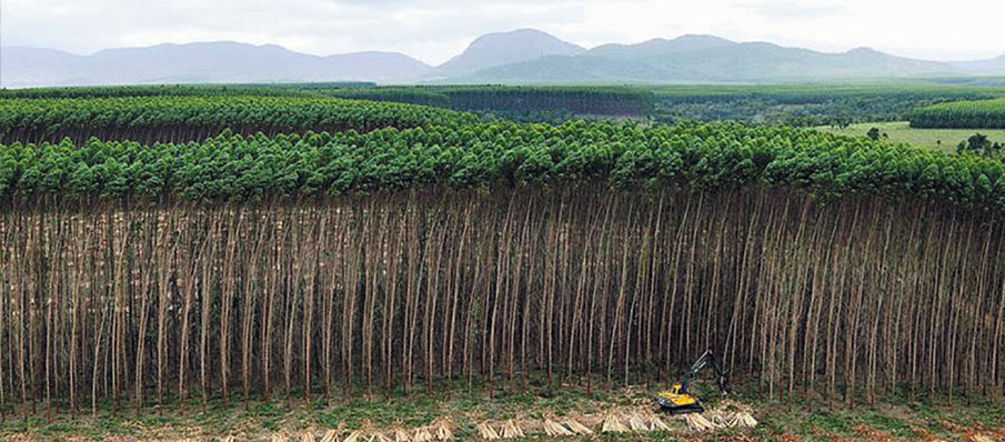
Completed campaign
Tell the United Nations: Plantations are NOT forests!
We delivered the petition and signatures to the UN at its World Forestry Congress in Durban in 2015. We are working on our next campaign together with our partners – we will not let up until the UN recognizes that plantations are not forests!
At the UN's World Forestry Congress in Durban, South Africa in September, policymakers, industry and others will debate the 'sustainable future' of forests and people. But there can be no sustainable future until the UN and governments accept that industrial tree plantations are crops that have nothing in common with real forests.
To: FAO General Director José Graziano da Silva, Trevor Abrahams and Tiina Vahanen
“The FAO definition reduces forests to mere tree cover. We strongly believe that this must be changed and that plantations must be defined as crops, not forests.”The world’s forests are being destroyed at a breathtaking pace.
In September, the UN Food and Agriculture Organization (FAO) will convene the World Forestry Congress in Durban, a gathering dominated by the timber industry. FAO’s approach to forests has long been marred by a fundamental misinterpretation: the organization defines forests as mere tree cover. Rainforests can be razed and replaced with rubber plantations, or highly biodiverse temperate and subtropical forests can be cut down to make way for sterile plantations of pine or eucalyptus – yet by FAO’s definition, this qualifies as ‘no net deforestation’. If grasslands are ripped up or peasants' land is grabbed and plowed up by companies to plant the industrial tree monocultures that many call 'green deserts' – FAO calls it ‘afforestation’!
FAO’s refusal to accept that forests are defined through their biological, social, cultural and spiritual diversity thus promotes the expansion of large-scale tree plantations at the expense of communities and real forests as well as other ecosystems. It also promotes false solutions to the climate crisis, viewing forests as mere carbon stores. Even plantations of genetically engineered eucalyptus and other trees are falsely called ‘forests’. This flawed definition has been denounced by civil society groups, social movements and scientists for many years.
During September’s World Forestry Congress, Rainforest Rescue will be joining civil society organizations and social networks around the world for the Civil Society Alternative Program, which will challenge the WFC’s profit-oriented model. We will speak out against the real causes of forest destruction and those responsible for it.
Please support our petition, which will be handed over to the World Forestry Congress.
To: FAO General Director José Graziano da Silva, Trevor Abrahams and Tiina Vahanen
Dear Mr. José Graziano da Silva, FAO General Director
Dear Mr. Trevor Abrahams, Secretary-General XIV World Forestry Congress 2015
Dear Ms. Tiina Vahanen, Associate Secretary-General XIV World Forestry Congress 2015
The FAO defines “forest” as “land spanning more than 0.5 hectares with trees higher than 5 meters and a canopy cover of more than 10 percent, or trees able to reach these thresholds in situ.”
This definition reduces forests to mere tree cover, discarding the structural, functional and biological diversity of trees and the many other species that make up a forest, as well as the cultural importance of the interaction between forests and communities.
The FAO forest definition benefits the interests of the timber lobby and the industrial tree plantation companies, including those for pulp and paper, rubber and bioenergy. Reducing forests to their function as carbon store benefits plantation companies even further, because it allows them to claim that industrial tree plantations are “planted forests” which soak up carbon particularly quickly. The carbon thus stored can then be sold as “carbon credits”, a false solution to climate change. The FAO definition even allows plantations of genetically engineered tree species to be classed as “forests”.
The expansion of industrial monoculture tree plantations, for example of eucalyptus, pines and acacia is, both directly and indirectly, a key driver of forest destruction. This expansion destroys biodiversity, contributes to climate change (as carbon in vegetation and soils is released during conversion to plantations) and devastates the lives and livelihoods of millions of indigenous and other forest-dependent peoples.
According to the FAO, at least 300 million women and men worldwide directly depend on forests for their livelihoods. FAO’s flawed definition of forests legitimizes and thus helps to facilitate those destructive impacts.
In its founding principles, FAO portrays itself as an organization leading “international efforts to defeat hunger”, as well as being a “neutral forum where all nations meet as equals”. To live up to this claim requires, among others, that FAO urgently revises its forest definition from one that reflects the preferences and perspectives of the timber, pulp/paper and rubber companies to one that reflects ecological realities as well as the views of forest-dependent peoples.
In contrast to the existing influence of the timber and plantation industry within FAO, a process of elaborating a new and appropriate definition of forests must effectively engage those women and men who directly depend on forests.
During the FAO's World Forestry Congress that will take place in Durban, South Africa, we – a broad group of social movements, NGOs and activists – commit to continue the campaign to move the FAO and all concerned institutions to initiate a process to formulate a new definition of forest led by forest communities.
We strongly believe that the definition currently used by FAO must be changed and that plantations must no longer be defined as forests.
Define forests by their true meaning!
Sincerely,

